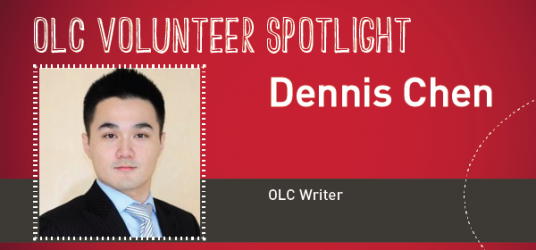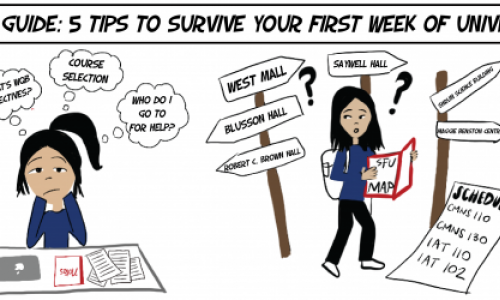
Dennis Chen has gotten off on an interesting start at SFU many years ago, bouncing between the different concentrations within the business faculty (Finance, MIS, Accounting, Human Resource Management and International Business!). In between switching his area of concentrations, he has also completed 5 co-op terms (2 with Canada Revenue Agency and 3 with Research in Motion), as well as an international exchange semester in Beijing, China.
Further to his very full resume, Dennis doesn't forget about volunteering in the SFU community to further his professional development and career opportunities.
On Volunteering with the OLC
Q. What made you first want to start volunteering?
After completing my first two co-op terms with Canada Revenue Agency and participating on an international exchange program in 2010, I was exploring career opportunities after my studies. However, as I explored, I soon had a chance to experience the rough job market firsthand as a result of the financial crisis in late 2008. As I had not actively participated in extracurricular or volunteer activities while in school, I thought the best way to improve my "employability" and personal qualifications was to develop more skills and gain more experiences. Thus, I began my quest on getting involved in almost every volunteer opportunities I could.
Q. What initially got you interested about OLC?
In my quest on becoming more involved with extracurricular activities, I learned that the OLC was recruiting student writers at the time, through the regular emails sent by the faculty of business as well and student organizations. From there, I applied and became a writer for the OLC.
Q. What did you enjoy the most or was the most rewarding part about volunteering in this position? What are some of the challenges new volunteers can expect from the position?
I found this volunteer experience a rewarding one as I had a chance to voice my opinions and help make a difference by sharing some of my personal experiences and mistakes I have made in the past with other students, and hopefully they will not have to go through the same mistakes I did.
I did not publish any articles until approximately 6 months after becoming a student writer, so some of the potential challenges from this position are time management and learning to taking initiative. During my time as a writer, I never had a deadline to meet for my next article, or what the next topic is. It is completely up to the writer to decide what, when and how to write whichever subject of interest at the writer’s own discretion and pace.
Q. In your opinion, how can becoming an OLC volunteer help students with their future career goals?
One of the essential qualifications and skills that almost all employers seek is communications skills, both oral and written. In my opinion, it is in the best interest of every student to take every opportunity to sharpen their communications skills in preparation for that golden opportunity for them to ace that potential life-changing interview. And to shine at that interview for your ideal job, having a well- established set of portfolio containing various written work and projects to showcase to an employer will certainly impress him or her.
Q. What skills can SFU students gain from this volunteer position?
By volunteering with OLC, student writers can gain valuable feedback from the experienced editors working at OLC on their writing and editing skills, which includes storytelling, writing style and clear articulation of ideas, all of which are valuable and integral parts to communication skills.
On Getting Involved in the Community
Q. What advice would you give to students looking to become more involved at SFU and in the community?
As a last year student who surely has his share of struggles and achievements through his undergraduate career, it is my advice for you to start planning or thinking about your career early on. From my personal experience, making sure you have access to information about potential career opportunities is critical. In my experience, most students only become more involved at SFU once they entered their 3rd year and start facing the pressure of landing their first career jobs after graduation. As a result of this, their academic performance usually suffers, and their social activity generally shrinks by half.
Thus, I would recommend you to subscribe to all the mailing lists of student clubs and organizations that you are interested in as soon as possible, and start attending some general meetings and events to identify the most appealing and rewarding opportunities as time is the most limited and valuable resource you will ever have. In addition to that, make sure you plan your time wisely to keep your commitments intact and academic performance afloat.
Don't miss out on Dennis' valuable tips and insights on career advancement and workplace success! Jump start your career now with Dennis' blog series.














